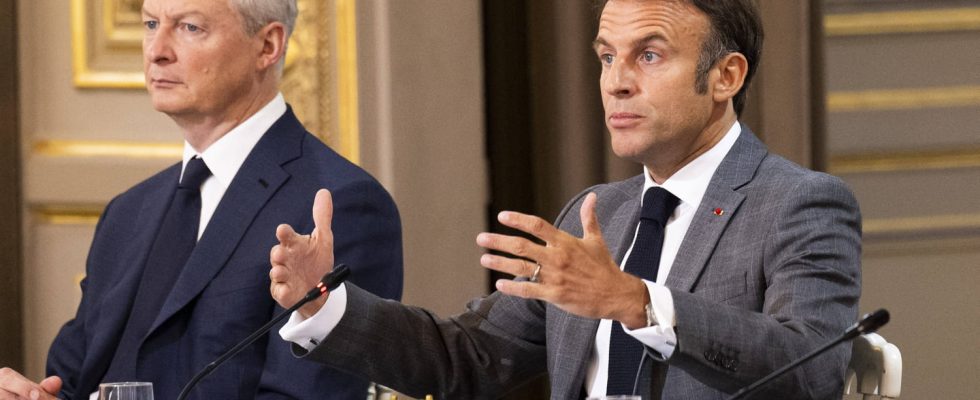To achieve its new objective of a public deficit of 5.1% of GDP, the government will have to find 10 billion euros in budget cuts in 2024.
5.1%. On Wednesday April 10, France indicated that it anticipated a public deficit of 5.1% of GDP for 2024, above the 4.4% initially forecast. An estimate which will require finding an additional 10 billion euros this year, in addition to the 10 billion euros in savings already announced last February. At the same time, traveling to Bergerac, Emmanuel Macron announced “to close the hypothesis” of an increase in taxes by defending a strategy, his own, which “produces results”.
“We must respond to this economic shock” indicated the President of the Republic in Dordogne. “We are staying the course: full employment, reindustrialization, rearmament of our public services and we are immediately closing the hypothesis of saying that we are going to resolve this economic shock with more taxes, French disease. That would remove confidence. We maintain the confidence of households, businesses, and our partners,” he concluded. As a reminder, in 2023, the deficit forecast by Bercy was 4.9% of GDP, it finally reached 5.5% of GDP due to lower than expected revenue.
The deficit is “linked to a failure to control operating expenses”
Without a tax increase, how can Emmanuel Macron and Bruno Le Maire find 10 billion euros? First of all, the Ministry of the Economy wishes to request an “additional effort of around 5 billion euros” from state administrations. A room for maneuver of “seven to eight billion euros” of frozen credits was notably retained as a precaution at the start of 2024, Bercy recalls. In February, a 25% reduction in office space occupied by the State had already been announced.
For Christian Saint-Etienne, economist and professor at the National Conservatory of Arts and Crafts (CNAM), a real problem exists because the deficit is “linked to a lack of control of operating expenses. It is a drift more than a project “It’s worrying. We are facing a rise in interest rates with, already this year, an interest charge higher than the defense budget” he regrets on France Info, this Friday April 12. Comments confirmed by Michaël Zemmour, teacher-researcher at the Lumière Lyon 2 University, still speaking to France Info: “for the moment, there are lenders for France, but they (interest rates) could go up, which could result in a high bill.
“The State has deprived itself of revenue”
Bercy would like to ensure that the operating expenses of local authorities remain in line with expectations. The public finance programming law provides for an increase of 0.5 points below inflation. However, in 2023, the ministry points to a “skid” with an increase in these expenses of 5.9%, notably linked to “personnel and purchasing expenses in a context of inflation”. If the government manages to limit the increase in this expenditure to around 2% in 2024, it could recover an additional 2.5 billion euros.
In fact, were the government’s forecasts too optimistic for 2024? Absolutely for Michaël Zemmour: “when the government draws up its budgets, it surely makes them optimistic. Then there are political choices. This year’s significant deficit is expensive”. According to him, “the State deprived itself of revenue” by lowering taxes for several years. Growth slows down in 2023 and “fairly significant tax cuts have started to be seen in tax revenues since 2017. If we want to reduce the deficit, we have to see which tax cuts are useful or not over the last ten years” continues -he.
The annuities of certain companies taxed?
While the executive assured that no tax increase would take place for households and “almost all businesses”, it could well tax the annuities of some of them. Energy companies are in particular in the sights, with a contribution on the inframarginal rent (CRI), an exceptional tax on the profits of energy companies launched in 2023. 300 million euros were collected in 2023. Ten times less than hoped, ” we expect a return significantly higher than what we experienced last year,” indicated the Minister of the Economy Bruno le Maire. The latter is also considering taxing certain CAC40 groups on buybacks of their own shares.
For his part, the economist Christian Saint-Etienne regrets the “quality of spending” which remains, according to him, “the central problem”. “We have the record for public spending in Europe. Do we get the best education in return? The best security? The best investment in the ecological transition? No” he complains this Friday on France Info.
